( – promoted by buhdydharma )
“Blank document”. I recall older Word versions and I seem to think it used to be “New Document”. New is so much more positive than Blank.
I had an English teacher in high school, Teresa Brandon, who’d say “Go for the guts.” She was a rebel teacher who brought Dunkin Donuts to our early morning English Lit/Shakespeare class each Wednesday, in defiance of the “No food in class” rules. Beyond her exemplary teaching, she also had an extraordinary talent – she could neatly shove a billiard ball in her mouth without locking her jaw. These are skills that impress a high school junior.
You are forewarned: if you are not up for reading ramblings of a reminiscent, tangential and seemingly unrelated nature, please move to the next diary…;)
In honor of Ms. Brandon (though against her desire of clean, concise length), I’ll unashamedly go for the gut and dammit, I won’t apologize. And this is not purely a candidate diary.
That said…
(crossposted at Dailykos)
At times I feel I’ve traveled a millenium, from a time when only tonsured monks could write, scratching with quills, delicately brushing precious gold leaf on intricately drawn drop cap scripts. I’ve now landed with little grace in front of an LCD screen and it should be so easy to break this writer’s block, this hurdle built by my own fatigue at bickering, life and fear and anger (and with some small disgust at the lack of civil candidate diaries, those penned without patience for civil discourse).
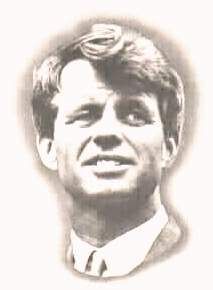 |
I am today announcing my candidacy for the presidency of the United States. I do not run for the presidency merely to oppose any man but to propose new policies. I run because I am convinced that this country is on a perilous course and because I have such strong feelings about what must be done, and I feel that I’m obliged to do all that I can. I run to seek new policies – policies to end the bloodshed in Vietnam and in our cities, policies to close the gaps that now exist between black and white, between rich and poor, between young and old, in this country and around the rest of the world. I run for the presidency because I want the Democratic Party and the United States of America to stand for hope instead of despair, for reconciliation of men instead of the growing risk of world war. I run because it is now unmistakably clear that we can change these disastrous, divisive policies only by changing the men who are now making them. Excerpted portions of the Announcement of Candidacy for President: Bobby Kennedy |
How do I get to the end of this white sheet that seeks to emulate parchment, or linen stock, or plain typewriter paper? This blank document has no feel of the old Underwood in the strange leather and fake tweed case with a chrome latch that was my brother’s typewriter, and my sisters’ machine before him. Clicking File, New, Blank Document doesn’t own the same tactile, muscle-memory physicality of selecting an 8 by 11 sheet of bleached fiber, feeding the crusty typewriter’s roller gut, turning the platen knobs that initiate the sheet into a new project, a new term paper, a critical business letter composed in perfect, painstaking Courier qwertyuiop.
I’ll start typing. I’ll go where Times New Roman takes me; on this Easter weekend, would any other font be so fitting?
My parents bought that Underwood for my much older siblings when they could least afford it in the late forties. I used the sticky-keyed monster for many years in the seventies – through high school and college. I typed my 48 page undergraduate senior thesis paper for my Political Science major at Willamette University in Salem, Oregon (on covert activities of the CIA, no less. Poli Sci, minor in History) in a day and a half – or rather, a best friend typed it for me while I wrote it. I passed each freshly written page to her in sync with the moment she finished typing the previous page. She was an opera singer in training and a far better typist than I, and a friend of my heart in those days. She’s one of the bits of my heart that I’ve lost in time, my fine friend Julie.
The old Underwood served me best when I didn’t have to use it, but instead convinced and bribed others to type my papers, assuring them I would write their papers for them if they’d only type mine. In high school days, I flunked typing – the only class I failed and dropped before the end of the quarter. I had no easy facility back then with small fingertip-sized concavity stiffly raised on steel pistons and I usually hammered the most misfit, mis-hit letters possible on smudged translucent stock. The devil snared me countless times as I changed the ribbons clumsily or lost an eraser or unraveled white-out tape down through the keys.
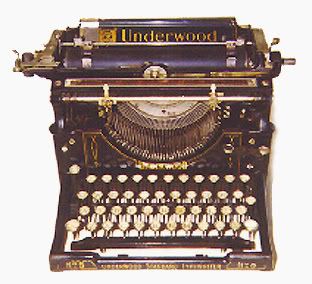 |
At the heart of that Western freedom and democracy is the belief that the individual man, the child of God, is the touchstone of value, and all society, groups, the state, exist for his benefit. Therefore the enlargement of liberty for individual human beings must be the supreme goal and the abiding practice of any Western society. The first element of this individual liberty is the freedom of speech: the right to express and communicate ideas, to set oneself apart from the dumb beasts of field and forest; to recall governments to their duties and obligations; above all, the right to affirm one’s membership and allegiance to the body politic–to society–to the men with whom we share our land, our heritage, and our children’s future. |
An odd memory pops up – I used to lose my mittens regularly between the bleacher seats at Friday night football games every fall in the small town where I grew up. Dad would faithfully track down the stairs to retrieve them, worthless things though they were to me. So patient. My mother would buy the gloves suspended at the end of long crocheted string that was meant to be threaded through the sleeves of a jacket and across the back.
My string was always on the outside. Mother would take the time to lick her thumb and smooth my child-thick eyebrows and carefully part my pixie cut; but the damn mittens would not be threaded through my coat. Too impatient. Mittens and gloves were not the stretchy, many-colored, polyester knit, one-size-fits-all pairs that you now find for 99 cents on the end-cap of a grocery store aisle. No, mittens and gloves were only at “The Golden Rule” department store, or the Bon Marche, or cheaper ones at the five-and-dime, but only in one season a year. They were not so much convenience items 40 years ago, nor were they always available year-round.
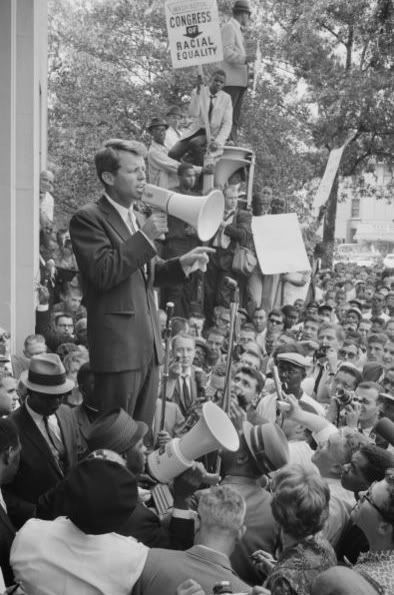 |
As a member of the cabinet and member of the Senate I have seen the inexcusable and ugly deprivation which causes children to starve in Mississippi, black citizens to riot in Watts; young Indians to commit suicide on their reservations because they’ve lacked all hope and they feel they have no future, and proud and able-bodied families to wait our their lives in empty idleness in eastern Kentucky. I have traveled and I have listened to the young people of our nation and felt their anger about the war that they are sent to fight and about the world they are about to inherit. In private talks and in public, I have tried in vain to alter our course in Vietnam before it further saps our spirit and our manpower, further raises the risks of wider war, and further destroys the country and the people it was meant to save. I cannot stand aside from the contest that will decide our nation’s future and our children’s future. |
Which was odd even then, forty years ago. Living in a Southern Oregon coastal town as I did, one of the clothing items that could be considered a necessity might well have been a pair of mittens or gloves. The wind blows eternally on the southern coast of Oregon. The coastal bluffs and tidal rock formations have been abused by relentless weather and there is always an unkept, wild feeling to the land, no matter how paved paradise becomes.
At the far southwestern reach of Oregon, the hills and mountain ridges might easily be living screenshots from Braveheart – imagine echoes of the kilted William Wallace hustling along the Glen Coe ridge tops with his pike and broadsword taking revenge on any clan that betrayed the cause of unity. The mists that swirl on the hills between Gold Beach and Brookings and northward above Port Orford well suit the piper’s song, where the grasses are gold in the late summer and early fall, and an occasional sheep dots the summer-dry and ridged hills. Most folks gaze at the pounding waves of the Pacific as they tour the coastline. I turned my young eyes to look at the hills on a Sunday drive, because the ocean seemed always the same to me; the same gray-blue, the same waves in, waves out; the same wind blowing across the sand dunes.
A kid grows quickly bored with familiar things and I was foolish enough then to think that the constancy of the sea was tedious.
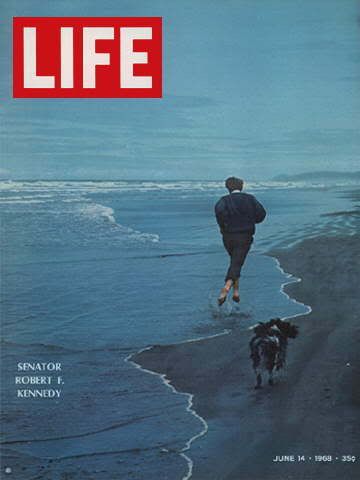 |
Hand in hand with freedom of speech goes the power to be heard, to share in the decisions of government which shape men’s lives. Everything that makes man’s life worthwhile–family, work, education, a place to rear one’s children and a place to rest one’s head–all this depends on decisions of government; all can be swept away by a government which does not heed the demands of its people. Therefore, the essential humanity of men can be protected and preserved only where government must answer– not just to the wealthy, not just to those of a particular religion, or a particular race, but to all its people. |
Those days, the acres on either side of Highway 101 were pretty much free range and it wasn’t uncommon to take a winding curve too fast from around a coved inlet of the highway and nearly collide with a small sheep herd, or wandering cows grazing the shoulders of a road barely set for two wide 1960’s autos. At a point near Ophir, I hope there is still a herd of elk that loiter near the highway – much like the elk herd in the green fields of the yawning alluvial valley adjacent to Loon Lake, near the mouth of the Umpqua River farther up the coast. Lush, damp wetlands; elegant massive animals moving slowly in the shadows of forested rising ridges. The façade of forested hill hides the clear-cuts that are away from the traveled roads, lands stripped conspiratorially away from an oblivious public.
It’s easy now, now that I’ve been gone nearly forty years, to impart a romantically Celtic aura to the Southern Oregon coast. But life near those Sometimes a Great Notion hills and valleys has been economically shattered for many long-time residents whose regional family roots stretch back to well before the first World War. Generational, cultural and economic depredations in fishing and logging have forcibly retrained entire families into more service and tourist-oriented jobs, like much of rural middle America. Low paying and seasonal now. It was once the most typical father-son endeavor to pull greenchain at the mills or nets on the boats in season, or operate a tiny 50-100 cow diary farm; enough for one parent of a family to put food on the table, if that parent also drove the school bus morning and night. Now, all economic activities are corporate-driven, the employers no longer benign or familiar or possibly related, and the unions for the most part have been busted. The commercial fishing is gone. The logging is…well, the old growth forests in Oregon are over 90% harvested.
The wind always blew or at least it did when I was young. Routine ever-present upper air lofts slam near-hurricane force winds against the continental bulkheads at least a half dozen times annually. Gloves were useful year-round.
When I was a kid, I had some subconscious thought that the wind was the wall that kept out the civilized world, or at least the urban world. There was no bustling traffic, even on Highway 101, except during parade days once a year in September. Maybe I thought it was too windy for city folk. We were miles and hours away from Eugene, or Portland, Oregon, and the trip across the lowest point of the coast range was a painful, slow one, even with parents who drove like fiends. I remember 1963, the fall when my brother, my nearest sibling, went off to college at the University of Oregon. I was five that year and the world was beginning to change, sometimes in awful ways. I remember things I saw and paid attention to the newness and difference of other towns and other people. The walls between small town life and the world were not so impenetrable after all.
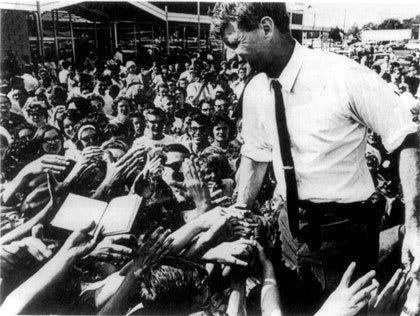 |
If we would lead outside our borders, if we would help those who need our assistance, if we would meet our responsibilities to mankind, we must first, all of us, demolish the borders which history has erected between men within our own nations–barriers of race and religion, social class and ignorance. |
Those towns between my small town and inland seemed mysterious and strange to a five or six-year-old.But the demographics were quite homogenous across the Southern Oregon counties from coast to inland valleys. Almost completely white, predominantly middle to lower class laborers and farmers and fisherman and service industry workers of the sixties; Southern Oregon politics, the majority Democrat versus Republican, in those days was perhaps more aligned philosophically with the Dixiecrat Democrat than any other flavor. The blue-collar sons were in Vietnam if they weren’t working in the mill or fishing; few daughters went away to college. Many, if not most, married a high school sweetheart and stayed within a few miles of home. We were far, far removed from the civil rights actions in the South, or the riots of Los Angeles; what was known was seen on the nightly news broadcast on the one or two channels that were available in our remote counties.
Sadly anecdotal, the one black man I remember seeing in my first five years of life was a teacher come to town, hired remotely through postal correspondence on the basis of his academic merits. The school district, desperate to hire qualified teachers to teach in a remote town far from the amenities of urban life, hired the teacher sight unseen. He lasted six months before his contract was terminated. The school board manufactured a bogus charge of theft, broke his contract in mid-year, and effectively ran him out of town. The players in this small town discriminatory drama are mostly long-dead now, and my memory is stretched by recounting the little details of an incident my mother spoke of. However, I recall her certainty that the theft charges were trumped up and the teacher banished solely because of the color of his skin. Suffice it to say there were no civil rights activists taking the side of honor in our town in the early 60’s.
Then came a second Kennedy. For my own parents, originally from the larger urban area of Seattle and having emigrated to Southern Oregon in the early 50’s, the prospect of voting for another Kennedy was more tied up with their involvement in the Democratic party as “Kennedy” Democrats, than as activists for civil rights. I’m caught up in memories I’ve pushed to the back of my mind again, things now rising during this election cycle – my parents’ casual, though occasional use of derogatory terms like “pickaninny”; the expression of their disapproval of interracial dating and marriage – brought to the fore when my oldest sister brought her “Negro” boyfriend home from college the year I was born in 1958; my mother’s avoidance of driving in predominantly black neighborhoods once we moved to Portland in the early seventies; the impact on my mother’s beliefs due to the “scandal” in her own family in the 1930’s. My mother’s aunt, my great aunt – I’ll call her Edna, though that was not her name – ran off from her seven kids and fire chief husband of many years to live with a black man in The Dalles, Oregon for six months before she was persuaded to return home by her husband. All these events, mostly prior to my birth, added to the undercurrent of racist foundations that threaded through a “white” family whose own Welsh miner immigrant origins passed through the antebellum Southern states of Missouri and Louisiana before pioneering to the West.
Bobby Kennedy swept through Oregon in May of 1968 during the Democratic primaries. Mere weeks after Martin Luther King’s assassination and a handful of days before his own death at the Ambassador Hotel in LA, Kennedy lost Oregon to Eugene McCarthy in a divisive, anti-war primary battle. Kennedy lost Oregon, but the resonant images from those weeks and his whistle-stop tour suggest his incredible appeal and the reach of his words.
“Give me a place to stand,” said Archimedes, “and I will move the world.” These men moved the world, and so can we all. Few will have the greatness to bend history itself, but each of us can work to change a small portion of events, and in the total of all those acts will be written the history of this generation. Thousands of Peace Corps volunteers are making a difference in isolated villages and city slums in dozens of countries. Thousands of unknown men and women in Europe resisted the occupation of the Nazis and many died, but all added to the ultimate strength and freedom of their countries. It is from numberless diverse acts of courage and belief that human history is shaped. Each time a man stands up for an ideal, or acts to improve the lot of others, or strikes out against injustice, he sends forth a tiny ripple of hope, and crossing each other from a million different centers of energy and daring those ripples build a current which can sweep down the mightiest walls of oppression and resistance.
I recall my mother speaking of the inevitable loss of the Presidency to the Republicans after Bobby was killed – Mother knew the future of the country would be forever changed with the death of another Kennedy, and that a McCarthy or Humphrey candidacy would never be strong enough to coalesce the separate elements of her party against Nixon. For me, the impact of RFK’s death was much stronger than his older brother’s assassination when I was five – this was the first politician whose speeches and voice I recall on television. He has stayed with me still. That wavering voice, those sad eyes, that rock star persona – coupled with the political activisim I saw on the television, though I did not see it in the streets where I lived.
Forty years later, I can pause and wonder how the path of the United States may have been changed had certain events not happened. I can consider a different world and assume it would have been a better world. Whatever my thoughts and speculation, the questions will not be answered by rewriting the past. What’s lost has been lost and cannot be regained. From that child of ten, I can still trace back my intense interest in politics to those days in 1968; Bobby Kennedy’s candidacy and his spectacular appeal to the Democratic youth of those late 60’s days in turmoil. He was a rare phosphorescence on the ocean, a green glow of light out of the constancy of waves. That magic glow of hope beckons to me still.
It’s easy to fall into a negative belief that a certain spark will not flare again, or a certain chance will not present itself, or that a window of opportunity has been permanently stuck shut. I’ve certainly fallen into that trap in these last few dismal years. But we need to avoid it. No matter what has been trampled on, destroyed, taken away, or watered down by those for whom the only necessary pursuit is for extraordinary profit or imperial power, reject the idea that we cannot make this country and subsequently this world a better place. We can.
Ideals can be turned to reality and truth. Some phrases embody the best of that truth, and of hope, though they were spoken on the saddest of occasions…
‘Some men see things as they are and say why. I dream things that never were and say why not.’
Quoting George Bernard Shaw in eulogy of his brother, Senator Edward Kennedy on June 8th, 1968
Like it or not we live in interesting times. They are times of danger and uncertainty; but they are also more open to the creative energy of men than any other time in history.
And everyone here will ultimately be judged–will ultimately judge himself–on the effort he has contributed to building a new world society and the extent to which his ideals and goals have shaped that effort.
So how do I nudge and push and cajole and prod my sluggish brain over the hurdle of this dense, miasmic, negative rock that sits in the blank document, in front of me, in front of the imaginary mental automobile of my deadlocked mind? By the way, that’s a long drawn out “awwwtowwwmo-beel” as the creative gas pedal now kicks in and sends the mental imagery driving across the synapses in my skull that tell me I must write something or die.
Geez, I could die tonight. Without writing another word. Without thinking another thought. Without ever defining what my wholly defeated soul has yearned to emboss in that hot wax drizzled randomly across fifty years of life. I could die unstamped on the world tonight. I must be turning fifty soon. Guess I need to start again.
Time to throw away the gloves. Toss out the old ways. Get rid of the obstacles that we unnecessarily construct as we must move forward.
What we need in the United States is not division; what we need in the United States is not hatred; what we need in the United States is not violence or lawlessness; but love and wisdom, and compassion toward one another, and a feeling of justice toward those who still suffer within our country, whether they be white or they be black.
**********************************************************************
(References to RFK speeches are as follows:
Excerpts from RFK’s Announcement for Candidacy Speech are interspersed with his Day of Affirmation Address at the University of Capetown, Capetown, South Africa, given on June 6, 1966.
The final quote is excerpted from RFK’s Statement On the Assassination of Martin Luther King, Jr.
All photos used herein are either Library of Congress public domain or courtesy of the Salem (Oregon) Public Library Historic Photograph Collection.)

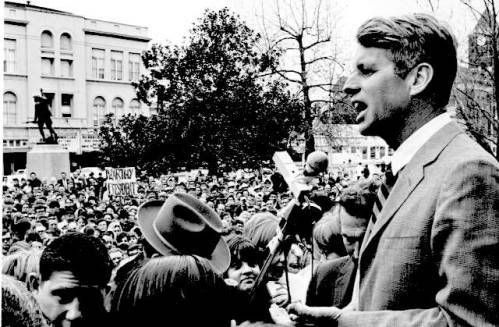
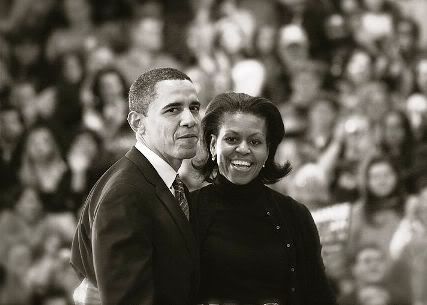
22 comments
Skip to comment form
Author
Long time, no see.
I’ve been hiding, like any overwhelmed groundhog.
It surely must be Spring soon, eh?
to read you again, exmearden. 🙂
a few years older than you… Bobby had a impact on my young life as well. sort of amazing, in retrospect. and can’t help but wonder what is happening now with kids 10, 12, 15 years old.
of the season. I worked for RFK’s campaign in Portland OR. I could not vote yet. He embodied for me a politician who understood the ‘fierce urgency of now’. He had made the journey of change, himself. He had the steel,fire and soul to turn the changes sweeping the country into progress and was both pragmatic and idealistic. That was the last time I was able to really overcome the distrust I felt for the ‘establishment’ politicians. The only one until now that saw what was needed in order to move our country away from fear and hate to ‘perfect the union’.
The specter of fascism, in the form of the Bush regime brought out of my apolitical stance. Obama and RFK both offer a way forward that involves the people, they call to our higher angels. They ask us all to take back the country, and they both have the the ability to cut through the myths that are used to keep we the people, from making the ripples that can and do shape the world. It is our responsibility, not any one mans, or womans.
Thank, I love it when you talk about Bandon, it brings me full circle.
and I haven’t really been politically active since. In 1968, I worked for presidential campaigns. It is too easy to be cynical after all of the Nixon years, Raygun years and so on. And much easier to just try to help each person individually as I can by nature of my profession.
One of the things that’s always interesting to me when I listen to or read speeches by either of the Kennedy brothers is the beauty and sophistication of their discourse. It is in such stark contrast to most political speech these days.
I think that is one of several reasons why Obama’s speech last week will always be remembered. He elevated the discourse.
I really only know Bobby through what I read. My grandparents, who raised me just outside Boston, had a picture of JFK on the wall. That photo made him legendary in the mind of a child.
The stature of MLK and RFK made a slow, imaginary ascent up that wall. As I grew to understand their words and the words of Jack, all three became linked in my mind, and all three were exactly equal. I was aware that all three were assassinated, but it was their words that linked them in my mind. It was only much later that the significance of all three having been assassinated really hit home and was felt in my bones.
You don’t have to believe in God or the Devil to understand there is evil in the world. They were destroyed because of their affirmations about all that is positive in mankind, and of our potential if we can just rise above.
They may have been killed, but their message wasn’t. The message will be repeated over and over until it sinks in. Obama carries the message. He may soon be in position to act on the message. He needs to show Congress the error in their ways. If it’s business as usual with him at the helm, then we either lose our hope or we set in motion the changes needed to realize the messages of Bobby, Martin, and Jack.
I really enjoyed your essay. Thank you.
for one of the most well written, thought provoking, personal and deeply political essays I have ever read at any time on the Internet or elsewhere.